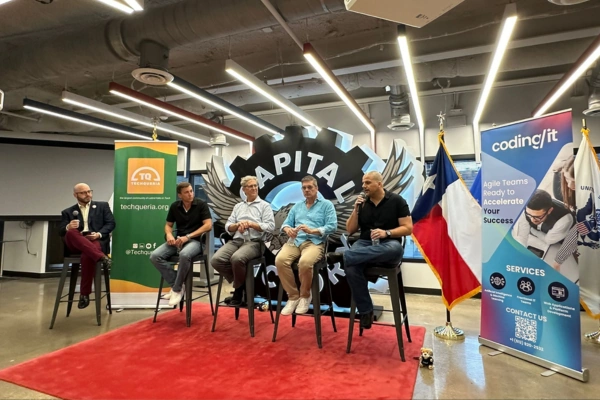Being a non-technical founder in the tech world can feel like stepping into a jungle without a map. You’ve got the vision, the business knowledge, and the drive, but when it comes to making technical decisions, things can get misty fast. And while you don’t need to become a coder overnight, having a basic understanding of these things can make all the difference in guiding your startup in the right direction.
That’s exactly why we hosted CTO Answers: Technical Guidance for Non-Technical Founders last week with Techqueria at Capital Factory in Austin. It was an incredible afternoon, packed with founders just like you, looking to level up their technical game.
We had a blast hearing from our panel of experts: William Baxter, Michael Couvillion, Jason Evanish, and Austin Geraci. These guys dropped some serious wisdom on how to build scalable teams, manage technical debt, and, most importantly, how to make the best tech decisions without being an expert yourself.
We also had the amazing support of our sponsors, Austin Beerworks, Capital Factory, emBlue, Forever Young Agency, Tax Hack Accounting Group, and WorldTech IT. Seriously, a big shoutout to them for helping make this event possible.
So, what can you expect from this article? Well, think of it as a guide—a conversation to help you understand what was shared at the event. We’ll break down some of the best advice, decisions, and tips for you. Whether you’re just starting or already scaling your post-revenue SaaS company, you should find here something to make smarter, more informed technical choices in the future.

Choosing the Right CTO
At the CTO Answers event, our panelists spent quite a bit of time discussing what it takes to find the right technical leader. Hiring a CTO isn’t just about finding someone who can write impeccable code. Yes, technical expertise matters, but what’s even more important is finding someone who aligns with your vision and understands your business goals. You’re looking for someone who can balance both the technical demands of the role and the broader strategy of your startup.
A key piece of advice from the panelists was to hire through referrals whenever possible. When you’re a non-technical founder, it can be hard to gauge whether someone has the right mix of skills and mindset. But by tapping into your network for recommendations, you’re more likely to find someone who not only has the technical expertise you need but also shares your values and vision for the company.
As a non-technical founder, you may not speak “developer,” but that doesn’t mean you can’t foster a strong working relationship with your CTO. You need a mutual understanding. You’ll want a CTO who can explain technical concepts in a way that makes sense to you, and in turn, you need to provide them with clear insights into your business needs and future goals. If there’s a lack of communication between the CEO and CTO, problems will start to snowball.
Don’t fall into the trap of hiring someone purely based on their technical knowledge. While it might seem tempting to get the person with the longest list of programming languages on their resume, what’s more valuable is their ability to align technology decisions with your business goals. The right CTO will think strategically about how technology can support the company’s growth, not just about the immediate technical problems in front of them.
Building an Effective Technical Team
Once you’ve nailed down the right CTO, your next step is building a solid technical team that can actually execute your vision. The good news is you don’t need to know everything about coding to put together a great team. What you need is to understand the principles of hiring well, fostering a good team culture, and continually recruiting the best talent to drive your business forward.
Building a team isn’t a one-time task—it’s an ongoing process. Successful founders are always on the lookout for great talent, even when they don’t have an immediate opening. This idea of “never stop hiring” was a major theme in our event, and it makes sense. Startups move fast, and as your business scales, you’re going to need a team that can keep up. With recruitment on your radar at times, you’ll already have strong candidates in mind when you need to hire.
Also, don’t underestimate the value of having a solid group of technical advisors to guide your team-building efforts. Founders who surround themselves with experienced professionals tend to make better hiring decisions. Advisors can provide valuable input, help you evaluate technical candidates, and ensure you’re asking the right questions during interviews. Even if you’re not fully comfortable assessing a candidate’s coding skills, advisors can help bridge that gap.
Balancing Technology with Business Goals
It’s easy to get dazzled by new tools, shiny frameworks, or trends like “machine learning” or “blockchain.” But here’s the thing—technology is just a tool. The real goal is to solve a business problem.
What’s more important than following every tech trend out there is understanding how technology can drive business value. Let your business needs drive the technology choices. A lot of founders get stuck because they fall in love with a certain technology, only to realize later that it doesn’t actually solve the problem they were trying to address in the first place.
Context matters. Your engineering team is creating solutions for your business. But if they don’t understand the broader business goals, their work might not hit the mark. Jason Evanish, CEO, Founder, and Head of Product of Get Lighthouse stressed the importance of giving your technical team insights into what the business is trying to achieve in the long term. If your team has a clear understanding of where the business is headed, they can make smarter decisions when it comes to building your product.
One thing you might not consider is that code is both an asset and a liability. Every line of code is an asset, and it starts depreciating the moment it’s in production, according to the CEO and founder of AlexaGuru, Michael Couvillion. Yes, the codebase is essential to your product, but it can also cause problems down the road if it isn’t carefully managed.
As your company scales, poorly planned code can become a burden. That’s why it’s important to view code not just as a collection of features, but as something that needs to be maintained and, sometimes, even reworked to keep up with your growing business. Understanding when to remove code is as powerful as refactoring the project, according to William Baxter, Co-Founder and CTO of Vertalo.

Making Smart Tech Stack Decisions
One of the common missteps you can make is overcomplicating the tech stack early on. It’s easy to assume that you need the fanciest, most advanced technology from the start to build a great product. But this often leads to unnecessary complexity, which can slow down your team, make it harder to hire, and even increase costs.
Instead, the panelists advised focusing on the immediate needs of your business. Pick tools that get the job done and can evolve as your company grows. You don’t need a cutting-edge tech stack if you’re still in the early stages of validating your product or market fit.
A key piece of advice was not to underestimate the power of simplicity. A simpler, well-understood tech stack can be much more effective than a complicated, advanced one. This way you are making development faster and it’s easier to hire developers who are familiar with those tools. It’s a lot simpler to find engineers who are comfortable with established frameworks than niche or new technologies that might not stick around for long.
Scaling and Refactoring
Once your startup starts to grow, scaling your technology becomes a whole new challenge. Know that you don’t need to scale everything at once. Instead, focus on your immediate needs, and grow your infrastructure as your business grows. The key is to balance short-term functionality with long-term scalability without getting too ahead of yourself.
Rewriting everything from scratch is risky and often unnecessary. Rebuilding the system from the ground up is usually overkill and can end up being a huge drain on both time and resources. The smarter move is incremental refactoring: adjusting and improving your codebase piece by piece, especially around key features.
Austin Geraci, CTO at WorldTech IT, made an important point during the event: “Not all problems are code problems.” How do you know when it’s time to refactor or even rebuild part of your system then? One of the telltale signs is when technical debt starts to slow your team down. Technical debt refers to the shortcuts taken in coding or systems design that make things work quickly but create problems later. If your development cycles are slowing down, your bug count is rising, or your systems aren’t flexible enough to support new features, it might be time to address that debt.
While it’s tempting to delay these technical fixes and focus solely on new features, it’s often more efficient to handle issues upfront. A good engineer solves problems before leaving the office, as our panelists put it.
Bridging the Communication Gap
At the CTO Answers event, the panelists stressed the importance of setting up clear communication channels between teams. Regular check-ins, such as daily standups or weekly sync meetings, are invaluable for making sure everyone is aligned on progress and priorities. These meetings are opportunities to highlight any roadblocks or misunderstandings before they turn into bigger issues.
Both technical and non-technical team members need to have a clear understanding of each other’s perspectives. As the business leader, it’s your job to make sure that your team has insights into your business challenges and long-term strategy. At the same time, you should be encouraging your technical team to communicate their needs and limitations in a way that’s accessible to everyone.
If the teams are disconnected, software solutions might be implemented that don’t actually solve the core business problem. To prevent this, involve your technical team in high-level strategy discussions when appropriate, so they can have context on how their work supports the company’s vision.
Learn from the Experts
As a non-technical founder, navigating the complexities of building and scaling a tech-driven business might seem overwhelming, but the insights shared by experienced leaders at the CTO Answers event show that you don’t have to go it alone.
At CodingIT, we’re passionate about helping founders like you make the right decisions at every stage of your journey. Whether you’re looking for mentorship, need a strong network of like-minded entrepreneurs, or require hands-on guidance in building your technical team and infrastructure, we’re here to support you.
Join our network, attend more events like CTO Answers, and keep learning from those who’ve already blazed the trail. Your vision is the driving force behind your startup—let us help you navigate the technical challenges with confidence. Reach out to CodingIT to see how we can support your growth, from networking opportunities to custom software development services. Together, we can take your business to the next level.
